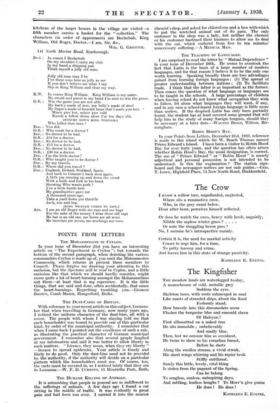POINTS FROM LETTERS
THE MOHAMMEDANS IN CEYLON.
In your issue of December 21st you have an interesting article on "The Experiment in Ceylon "; but towards the bottom of the second paragraph, when denoting the various communities Ceylon is made up of, you omit the Mohammedan Community, which returns at present three members to Council. Please forgive me drawing your attention to this omission, but the Spectator will be read in Ceylon, and a little omission like that which we should hardly consider, might cause quite a lot of heart-burning amongst the Mohammedans out there—at least that is my experience. It is the little things, that are said and done, often accidentally, that cause the heart-burnings. Regretting troubling you.—GnaaGE BROWN, Comb Manor, Hungerford, Berks.
THE DUST-CARTS OF BRITAIN.
With reference to your recent article on this subject, I remem- ber that when travelling in Germany, now many years ago, I noticed the uniform character of the dust-bins, all with a cover. The people with whom I was staying told me that each householder was bound to provide one of this particular kind, by order of the municipal authority. I remember that when I came back I pointed out the excellence of such a rule, as illustrating the practical character of German municipal government. I remember also that several people laughed at my information and said it was better to allow liberty in such matters. "Licence, they mean, when they cry liberty" —licence to spread epidemics. Your article is timely and likely to do good. Only the dust-bins need not be provided by the authority, if the authority will decide on a particular pattern which the householders must use. Of course, too, the carts must be covered in, as I noticed lately that they are in Lausanne.—W. F. D. CuirroYs, 11 Henrietta Park, Bath, THE HUMANE KILLING OF ANIMALS.
It is astonishing that people in general are so indifferent to the sufferings of animals. A few days ago I found a cat sitting in the middle of traffic. It was evidently in great pain and had been run over. I carried it into the nearest
chemist's shop, and asked for chloroform and a box with which to put the wretched animal out of its pain. The only customer in the shop was a lady, but neither the chemist or- his customer hastened their business to allow me to deal with the cat, which endured from five to ten minutes' unnecessary suffering.—A MEDICAL MA-N.
THE TEACHING OF LANGUAGES.
I am surprised to read the letter by "Mutual Dependence" in your issue of December 28th. He seems to overlook the fact that Latin is the basis of a large number of modern languages, and for that reason I believe it to be the only one worth learning. Speaking broadly there are two advantages gained from learning foreign languages : (1) The spread of greater understanding between nations ; (2) To facilitate trade. I think that the latter is as important as the former. Then comes the question of what language or languages are to be taught in the schools. A large percentage of children when leaving school do not know what occupation they wish to follow, let alone what languages they will want, if any, and in any case a school-learnt foreign language is little more than useless. If the despised Latin has only been partially learnt, the student has at least covered some ground-that will help him in the study of many foreign tongues, should they be necessary at a later date.—WALTER BIGGS, Witton, Bir- mingham.
ROBIN HOOD'S BAY.
In your Points from Letters, December 21st, 1929, reference is made to this island which Sir W. Beach Thomas named Prince Edward's Island. I have been a visitor to Robin Hood Bay for over forty years, and the question has often arisen whether Robin Hood's Bay, the usual designation, is correct. The use of "Prince Edward" or "Robin Hood" is merely adjectival and personal possession is not intended to be understood. Is this the explanation ? The station sign- board and the newspaper notices are not safe guides.—GEO. T. Lows, Highlield Place, 74 New North Road, Huddersfield.










































 Previous page
Previous page